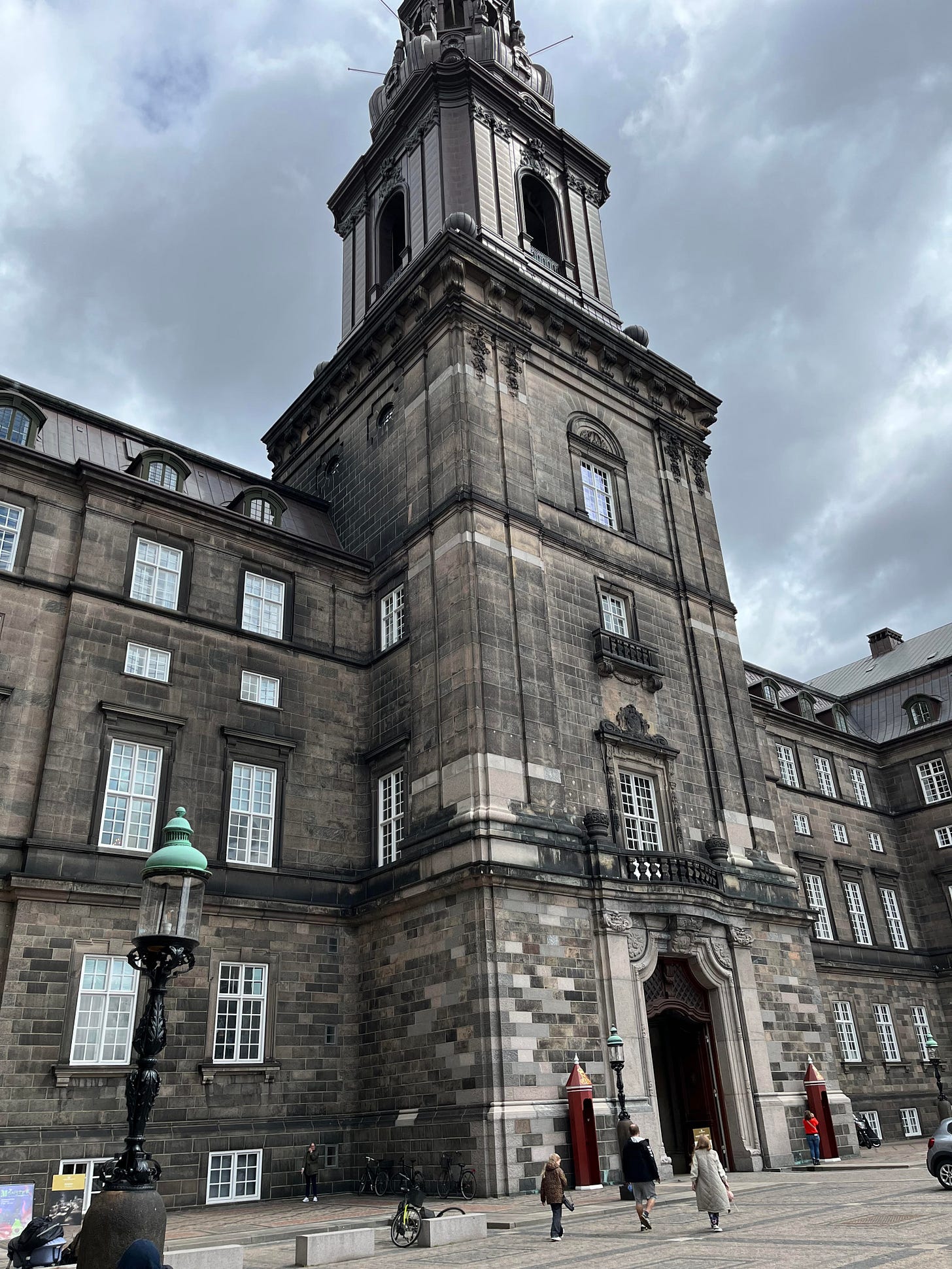Hear me out, but maybe PR is the answer
Britain has had enough of Tory infighting
I visited the Danish Parliament last year. While taking my mother on a mini-break to Copenhagen, I managed to get a tour of the Folketing, a remarkable testimony to Scandinavian moderation and reasonableness.
While being taken along the corridors of (modest) power, our guide bumped into a politician, whom he introduced to us as the Danish immigration minister, and I had the involuntary urge to blurt out ‘based’, before remembering I was a middle-aged man who spends too much time on social media.
For all that this was very Borgen, comforting and hygge to middle-class sensibilities, and the politician came from Denmark’s centre-Left party, their government’s policies on the subject of immigration are to the Right of Britain’s Conservatives.
Yet despite this, and particular controversy over its anti-ghettoisation policy, the little kingdom across the North Sea manages to maintain a much better image than we do. Partly this is due to tone, and in a touching letter issued during the Brexit crisis, Denmark’s government made a pledge to look after its British citizens, an embarrassing contrast with the May regime’s lack of reassurance towards EU citizens here.
Britain, in contrast, and partly for reasons related to Brexit, has managed to paint itself as the land of bad vibes while in reality being much more open to migration, both legal and illegal - for which the Home Office is much to blame. Theresa May pioneered this negative triangulation, with her notorious ‘Go Home’ vans, but successors Priti Patel and Suella Braverman have both managed the unusual feat of becoming pantomime villains to respectable middle-class opinion while presiding over record levels of immigration both of the official and unofficial variety.
Of course Braverman, in her defence, was hamstrung, as she makes clear in her letter to the prime minister - now viewed by 30 million people - blaming Sunak for failing his promises on immigration.
It’s worth pointing out that Braverman does not have huge public support, even among Conservatives. Perhaps that reflects her failings as a politician to connect with voters, or just a general malaise and distrust of anyone who carries the poisoned chalice of the Home Office. Whether or not Braverman could be held responsible, it is obvious that the Tory party never intended to reduce immigration, as promised – quite the opposite. They always regarded the Blair-era figures as rookie numbers, even if they preferred to move the conversation away from legal levels to ‘the boats’.
This is strange considering how Brexit accelerated the ‘great realignment’, which resulted in identity replacing economics as the crunch issue. Before the referendum, Tory voters were negative about immigration’s effect on cultural life, but only by 40 to 31 per cent, while Labour were more positive, at 42 to 31 per cent in favour. Afterwards Tory voters were now 50-23 per cent against immigration and Labour voters 59 to 34 per cent positive.
The realignment was best summarised by Stephen Davies for Cato Unbound, who explained that ‘stable and effective government’ requires coalitions to form over one core issue and one secondary issue. Voters tend to divide on these ‘aligning issues’, at the expense of all others, often joining groups who they otherwise disagree with on a great deal.
Although some issues do tend to cluster for psychological reasons – people who favour defence spending tend to also be harsh on crime – within these large coalitions people’s views on other issues tend to align, ‘even when there is no logical reason why they should’. As an example, he said, ‘there is no reason why support for free markets should necessarily go along with enthusiasm for capital punishment, but in many times and places this has been the case’.
However, these alignments don’t last forever, because the issue will be settled; for example, the relationship between the Church of England and the state was once the core divide in British politics but you don’t see many people arguing about that now. The last realignment took place in the 1970s, when government intervention and ‘egalitarian redistribution’ became the primary issue, ‘while the secondary one was over how far the government should use its power and the criminal law to uphold a particular set of moral norms and rules’. This produced four blocks, two of which formed the Left – state interventionist egalitarians and social liberals - and two the Right – free marketeers and social conservatives.
Today the primary divide is ‘between globalism and cosmopolitanism on the one hand and nationalism and ethnic or cultural particularism on the other’. This is the major issue over which politics is fought, and so everything else tends to be secondary.
The largest block of voters in Britain are what Davies called ‘national collectivists’, who tend to be nationalistic, sceptical of globalisation and supportive of government activism in the market, as well as a strong welfare state: ‘they are cultural traditionalists and (often) social conservatives, and they support traditional ideas of identity, particularly masculinity and femininity’.
They align with free market conservatives, whom Davies calls ‘national liberals’, but this is an unstable coalition because their interests are diverging, and this latter group also have much in common with a third, ‘cosmopolitan liberals’, whom he describes as ‘broadly free market, strongly cosmopolitan and globalist, socially liberal, and egalitarian’. Finally, there is the radical left, in favour ‘of an interventionist economic policy, also strongly globalist and cosmopolitan, but also committed to a kind of radical identity politics.’
The national collectivists tend to be older, less likely to have attended university, and concentrated in rural areas or small towns, while the liberal cosmopolitans and radical left are both younger, university educated and more professional, and live in big cities.
The Tories won in 2019 by getting large numbers of national collectivists to vote for them, a block now represented by Miriam Cates and Danny Kruger of the New Conservatives. In the post-Brexit settlement, these voters are the richest picking for the Right, even if their numbers are in relative decline.
Yet despite this realignment, the Government decided to adopt a policy most at odds with their new voting base. Indeed, I wonder if their decision to raise immigration after Brexit will be one of those things that really puzzle historians, considering how the issue was such a strong motivator for the vote.
The most reasonable explanation is that they memed themselves into the Vote Leave idea that ‘what matters is control’. Or that high rates of immigration suited their donors. Another is that Tory MPs tend to be far more liberal than their voter base; indeed, the average Tory MP is as liberal as the average Labour voter, which once out of office they become far clearer about. The end result is a party both alienated from its voters, and constantly struggling within itself.
Sunak’s regime now seems to have given up on the national collectivist block, but the problem for the Conservatives is that they don’t have enough of either the national collectivists nor national liberals to form anywhere near a majority. They have too much alienated the former over immigration, and the latter over the economy (and, to some extent, Brexit).
The great realignment is happening, whether the Tory party like it or not, and demographic trends are not going in their direction. This might not have concerned them in 2019 because they were unusually lucky in many ways: the other side was split, while the Brexit front was united; the opposition had an unusually Left-wing and incompetent leader, whose own rise to power was something of a black swan originating in a drunken Westminster brawl; and the generational shift working against conservatism hadn’t yet had time to take effect.
Now Corbyn is back to being a marginal figure and the prospect of Keir Starmer doesn’t frighten us; yes, we will get a lot more of what Tory MPs call woke, without really understanding what that means, but we get that anyway.
That is better than what we have now, the long drawn-out psychodrama of constant internal wrangling over control of the Tory party, which has become completely incoherent; one reason why the Government often talks like it’s in opposition promising to change the failed policies of the past (theirs).
This is why I’ve come around to the idea of something like Danish-style proportional representation which, contrary to the historical lesson we all learned from studying Weimar Germany at school, perhaps can encourage more moderation.
In a system of proportional representation we could at least have coalitions that are stable. Were the two right-wing parties to enter government together they could have negotiations over immigration first, rather than just lying to voters and overcompensating by trying to sound tough and unwelcoming. (As an added bonus, PR would also reduce the incentives for MPs to boost NIMBYism, which is impoverishing the country.)
Perhaps, as in Denmark, the centre-left might adopt more conservative policies on immigration to ensure the success of its social-democrat agenda, although the pull from both sides ensures moderation. Denmark has relatively high levels of immigration, although it overwhelmingly comes from other parts of Europe, which is what voters both there and here favour; but whether you support that or not, Danes at least have the choice of voting for the parties that most suit their preferences on the subject. In that way, despite remaining in the EU, they seem to have more control than we do.




Okay, I have heard (read) you out. No, the public has not 'had enough of Tory infighting', they've had enough of the Tories. In fact, I detect that they have had enough of the entire political class. PR just means a new boss, who is the same as the old boss. I submit that something more radical is required if our country is to be saved from a dismal fate.
In a recent YouGov poll only 39% of British population were in favour of taking any Palestinian refugees - at all. There is a real danger we are over complicating this.
People just want the Government to do something about migration without comment or fuss. They are much, much less interested in the media driven pyschodrama than politicians assume. Even nice middle class people will go along with it (breathing a sigh of relief) providing that they are not inconvenienced to be made to feel guilty about the issue.